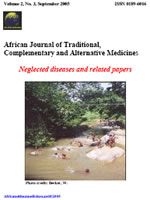
|
African Journal of Traditional, Complementary and Alternative Medicines
African Ethnomedicines Network
ISSN: 0189-6016
Vol. 14, No. 2, 2017, pp. 92-102
|
 Bioline Code: tc17046
Bioline Code: tc17046
Full paper language: English
Document type: Research Article
Document available free of charge
|
|
|
African Journal of Traditional, Complementary and Alternative Medicines, Vol. 14, No. 2, 2017, pp. 92-102
| en |
EVALUATION OF THE CHELATING EFFECT OF METHANOLIC EXTRACT OF CORIANDRUM SATIVUM  AND ITS FRACTIONS ON WISTAR RATS POISONED WITH LEAD ACETATE AND ITS FRACTIONS ON WISTAR RATS POISONED WITH LEAD ACETATE
Téllez-López, Miguel Ángel; Mora-Tovar, Gabriela; Ceniceros-Méndez, Iromi Marlen; García-Lujan, Concepción; Puente-Valenzuela, Cristo Omar; Vega-Menchaca, María del Carmen; Serrano-Gallardo, Luis Benjamín; Garza, Rubén García & Morán-Martínez, Javier
Abstract
Background: The rate of lead poisoning has decreased in recent years due to increased health control in industries that use this metal.
However, it is still a public health problem worldwide. The use of various plants with chelating properties has been a topic of research
today. In traditional medicine, it is said that Coriandrum sativum has chelating properties, but there is no scientific evidence to support
this fact. The purpose of this research is to evaluate the chelating effect of methanol extract of coriander and its fractions on Wistar
rats intoxicated with lead.
Materials and Methods: In this research, male Wistar rats were poisoned with 50 mg/kg of lead acetate and treated with 50 mg/kg of
methanol extract and its fractions. The extract and its fractions were administered to four treatment groups. Positive and negative
controls were established. Hemoglobin, hematocrit and lead concentrations were analyzed; liver was evaluated histologically in
control and treatment groups.
Results: The methanol extract of coriander presented a LD50 ˃1000 mg/dL. The group administered with the methanol extract showed
significant difference in the levels of hemoglobin and hematocrit compared to the negative control group. Lead concentration in
treatment groups showed a decrease compared to the positive control. Histological evaluation of tissue showed less damage in groups
administered with methanolic extract and its fractions compared to the positive control which presented structural alterations.
Conclusion: Coriander extracts protect liver and lower lead concentration in rats intoxicated with lead in contrast to the positive
control group.
Keywords
Lead; chelatin effect; natural products; Coriandrum sativum
|
| |
© Copyright 2017 - African Journal of Traditional, Complementary and Alternative Medicines
Alternative site location: http://journals.sfu.ca/africanem/index.php/ajtcam
|
|
